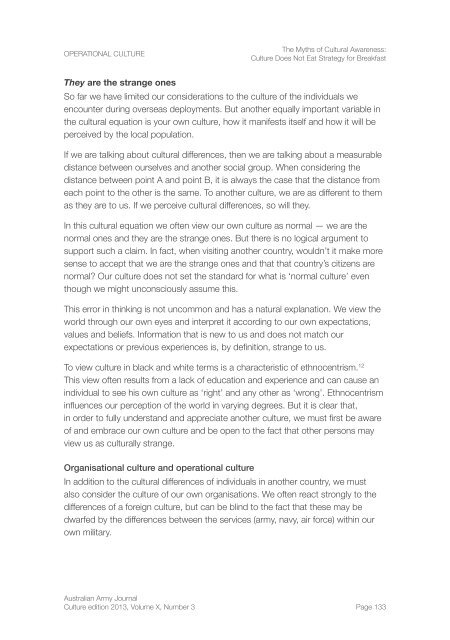Australian Army Journal
Australian Army Journal
Australian Army Journal
You also want an ePaper? Increase the reach of your titles
YUMPU automatically turns print PDFs into web optimized ePapers that Google loves.
OPERATIONAL CULTURE<br />
The Myths of Cultural Awareness:<br />
Culture Does Not Eat Strategy for Breakfast<br />
They are the strange ones<br />
So far we have limited our considerations to the culture of the individuals we<br />
encounter during overseas deployments. But another equally important variable in<br />
the cultural equation is your own culture, how it manifests itself and how it will be<br />
perceived by the local population.<br />
If we are talking about cultural differences, then we are talking about a measurable<br />
distance between ourselves and another social group. When considering the<br />
distance between point A and point B, it is always the case that the distance from<br />
each point to the other is the same. To another culture, we are as different to them<br />
as they are to us. If we perceive cultural differences, so will they.<br />
In this cultural equation we often view our own culture as normal — we are the<br />
normal ones and they are the strange ones. But there is no logical argument to<br />
support such a claim. In fact, when visiting another country, wouldn’t it make more<br />
sense to accept that we are the strange ones and that that country’s citizens are<br />
normal? Our culture does not set the standard for what is ‘normal culture’ even<br />
though we might unconsciously assume this.<br />
This error in thinking is not uncommon and has a natural explanation. We view the<br />
world through our own eyes and interpret it according to our own expectations,<br />
values and beliefs. Information that is new to us and does not match our<br />
expectations or previous experiences is, by definition, strange to us.<br />
To view culture in black and white terms is a characteristic of ethnocentrism. 12<br />
This view often results from a lack of education and experience and can cause an<br />
individual to see his own culture as ‘right’ and any other as ‘wrong’. Ethnocentrism<br />
influences our perception of the world in varying degrees. But it is clear that,<br />
in order to fully understand and appreciate another culture, we must first be aware<br />
of and embrace our own culture and be open to the fact that other persons may<br />
view us as culturally strange.<br />
Organisational culture and operational culture<br />
In addition to the cultural differences of individuals in another country, we must<br />
also consider the culture of our own organisations. We often react strongly to the<br />
differences of a foreign culture, but can be blind to the fact that these may be<br />
dwarfed by the differences between the services (army, navy, air force) within our<br />
own military.<br />
<strong>Australian</strong> <strong>Army</strong> <strong>Journal</strong><br />
Culture edition 2013, Volume X, Number 3 Page 133

















